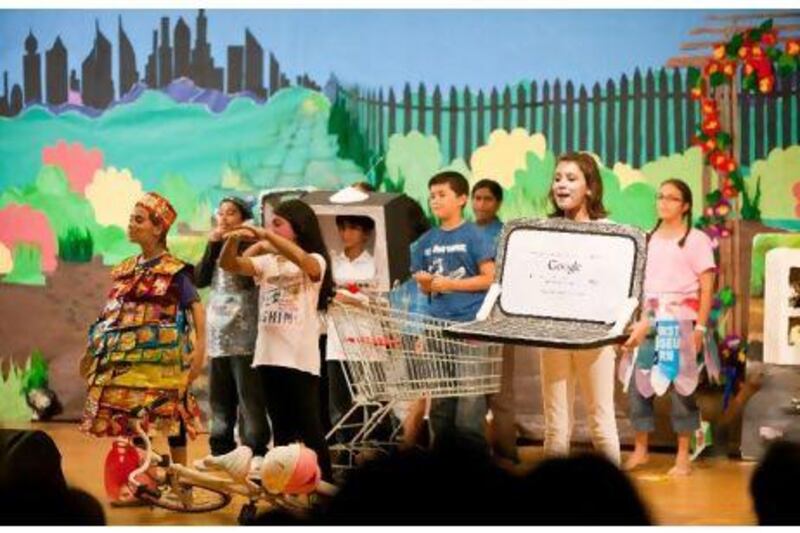RAS AL KHAIMAH // Sultan al Nuaimi, age 10, saw a school play that included an oil slick, and was so intrigued that he poured cooking oil into his pet turtle's pond.
Sultan was not meaning to be cruel. In fact, he loves animals. He simply wanted to re-enact a scene from the play that had impressed him.
"It was a little bit scary for about 10 seconds," Sultan confessed after imitating the turtle's convulsions. "No, I wasn't worried. It didn't die."
Sultan may have the mind of a budding scientist, but it was a musical that taught him this lesson about dependence on our fragile environment.
He was one of a cast of 83 pupils from grades 5 and 6 who performed One Planet Future last Monday night at the Ras al Khaimah English Speaking School.
Teachers there are using theatre to reach the pupils in a way that is just not possible through conventional classroom methods.
Sultan's enthusiasm is evidence that the approach is working, said the play's director, Vicki Louatel. "The children who are actually acting it are learning, even if they don't know they're learning," she said. "Quite often in schools they're always talking about rubbish and cleaning up, but with theatre you've got the 'wow' factor, which means everyone is switched on."
The play, based on a script by Debbie Campbell, who lives in the UK, was originally written for the World Wildlife Fund. It was put on at the RAK English Speaking School with the goal of teaching students and their parents how to protect the environment.
Pupils played discarded bits of junk, strutting their stuff against a painted backdrop of the Dubai skyline. At one point Ibrahim al Zaabi, who is 11, walked on the stage dressed as a glittering mobile phone and wailed about becoming obsolete.
"I used to be Noura's best friend," he cried. "She took me everywhere with her. Now it's all about BlackBerrys." Art was imitating life: Ibrahim said many of his friends had dumped perfectly good mobiles for BlackBerrys. His own phone is broken, and he says the play has convinced him to get it repaired instead of throwing it away and buying a new one.
Some performers planned to use the event to educate their relatives. Enad al Marzouqi, who is 13, used his fedora hat and hip-hop skills to play a "cool, dangerous and sneaky" oil can for an audience that included his aunt and grandmother. He said he planned to talk to them after the show about the oil he has seen on RAK beaches.
Sultan wanted to be in the play because he saw that last year's performers were treated to ice cream, but for Tony Yoo, also 11, it was another chance to educate his classmates. When not performing as a grub singing about life cycles, Tony is also a member of Planet Pals, a school group that promotes environmental awareness.
"The theatre is more realistic than the class," he said. "In classrooms you learn by books and sitting on chairs, but in the theatre you learn to do the actions."
Ms Louatel uses drama regularly in her Grade 6 class to engage pupils in language and comprehension, which she sees as essential in a school where she estimates 80 per cent of students consider English a second language.
"You give them a play script, and suddenly they can read the words because they want to act so much, whereas if you give them a book they might not actually want to read it," she said.
The extra interest in going onstage is helpful, as there is no set course dedicated to environmental studies at the school. Teachers must cover everything from the environment to emotions, health and even racism in one 50-minute weekly class called personal, social and health education. The five weekly rehearsals allowed Ms Louatel to sneak in extra learning as song and dance.
"It allows them to do things that we wouldn't have in the curriculum. Timetable-wise, it wouldn't be possible," she said. "The year 6 students can switch off when they're told the same message in the same way every single time, but on stage, it's their friends."
Marie Vigliotti, age 11, goes so far as to blame her character, a group of discarded plastic bags, for the potential extinction of the human species. Her favourite discovery from the play came when she learnt that most flowers have male and female reproductive parts.
"They're all memories and lessons that you keep forever because you've had to learn the lines and not just talk about it once or twice," she said.





